I currently have Spring AOP defining an aspect for logging(Logging Aspect) on a Spring Bean (Target Implementation). When I access the method normally (Regular Access) My Implementation runs and I receive logs. However, when I access my implementation via reflection (Reflection Access) My implementation runs, but I do not receive any logging. I would like to understand why this is and how I can get my reflection based access pattern to get logs. See Reference picture
Full example: (Note the reflection call actually comes from the parent class)
Parent Class (with reflection call)
public class EventValidationHandler {
private List<Method> aggregateMethods;
public EventValidationHandler() {
aggregateMethods = getMethodsAnnotatedWithAggregateEventHandler(this.getClass());
}
public boolean validateEvent(DomainEvent event) throws Exception {
Class clazz = event.getClass();
for(Method method : aggregateMethods) {
for(Class aClass : method.getParameterTypes()) {
if(clazz.equals(aClass)) {
Object response = method.invoke(this, event);
return (Boolean) response;
}
}
}
throw new NoSuchMethodError("Unable to locate event validator method for event type: " + event.getClass().getSimpleName() + ". Please confirm method is annotated with @" + EventValidator.class.getSimpleName());
}
private static List<Method> getMethodsAnnotatedWithAggregateEventHandler(final Class<?> type) {
final List<Method> methods = new ArrayList<>();
final List<Method> allMethods = new ArrayList<>(Arrays.asList(type.getDeclaredMethods()));
for (final Method method : allMethods) {
if (method.isAnnotationPresent(EventValidator.class)) {
methods.add(method);
}
}
return methods;
}
}
Implementation
@Component
@AllArgsConstructor
public class MyEventValidator extends EventValidationHandler {
private AggregateRepository aggregateRepository;
@EventValidator
public boolean isValid(CreateProfileEvent event) {
if(aggregateRepository.findOne(event.getEmployeeId()) == null) {
return true;
}
return false;
}
@EventValidator
public boolean isValid(ChangePhoneNumberEvent event) {
if(aggregateRepository.findOne(event.getEmployeeId()) != null) {
return true;
}
return false;
}
}
Logging Aspect
@Aspect
@Component
public class MyEventValidatorLoggingAspect {
public static Logger log = LoggerFactory.getLogger(MyEventValidator.class);
@Pointcut("execution(* com.mcf7.eventsourcing.test.data.events.MyEventValidator.isValid(com.mcf7.eventsourcing.test.data.events.CreateProfileEvent))")
private void createProfile() {}
@Before("createProfile()")
public void logHere(JoinPoint joinPoint) {
log.info("super cool log of create profile");
}
}
